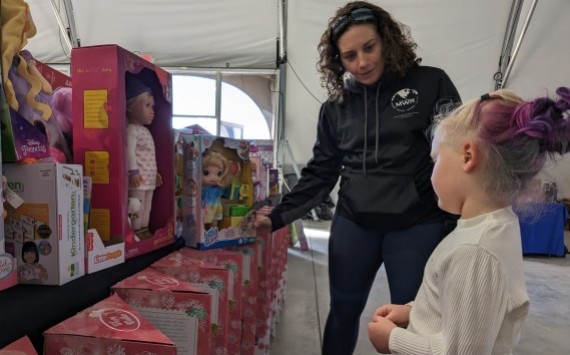FORT IRWIN, Calif. — When Capt. Lisa Snow thinks about the tough realities military children face every day, one moment stands out in her mind.
She was attending her son’s cross-country meet when one of the other kids at the event noticed her father in the crowd.
“Her dad walked up and she absolutely lost it in excitement because she didn’t expect her dad to come,” Snow remembers. “She was hugging him, screaming; it was one of those videos that you see at the homecomings.”
At the time, Snow was grateful that the Soldier’s command had supported him and allowed him to attend his daughter’s sporting event. But it also hit home that military kids often don’t have a regular parent presence in their life – not because they have bad parents, but because their parents are in the Army.
Along with their parents, military kids regularly deal with deployments and all of the associated stress. While Soldiers stationed at the National Training Center don’t necessarily deploy, they do spend ten months out of the year going into the “Box” to train other units. That means many kids don’t have one of their parents in the home every other night, or even two or three weeks at a time.
“I feel like military children don’t get enough credit for being the heroes that they are,” said Snow, who is a general pediatrician at Fort Irwin’s Weed Army Community Hospital.
“We have a very unique population here at NTC and Fort Irwin because we do support this amazing training program for the rest of the Army that is super important and integral. And as a result, our children are dealing with a lot of stress” she added.
Snow said she sees the kids’ remarkable resiliency on a daily basis. Dr. Earl R. Seegrist, the pediatric clinical psychologist at WACH, agreed.
“The thing I love about children is that they are always willing to step-up and meet the sunshine with a smile and they do the best with what they have to work with,” he said. “One of the wonderful things we get to do here is we get to give them tools, and we get to give the parents more tools.”
For example, at WACH, there is a behavioral health specialist and a pediatric psychologist. The hospital is also working on embedding a behavioral health counselor in the primary care clinic so patients would be one step closer to those services.
In addition, all of Fort Irwin’s schools have the Military and Family Life Counseling Program. The MFLC program provides short-term, non-medical counseling support for a range of issues, including relationships, crisis intervention, stress management, grief, occupational and other individual and family issues. It also offers psycho-educational presentations focused on issues common to the military family, such as reunion and reintegration, stress and coping, grief and loss, and deployment.
There are also social workers available through the Family Advocacy Program, which offers services that are geared toward new parents. The nurse who runs this program on post offers classes, play groups and even in-home visits if parents just need a little reassurance they are doing everything right.












